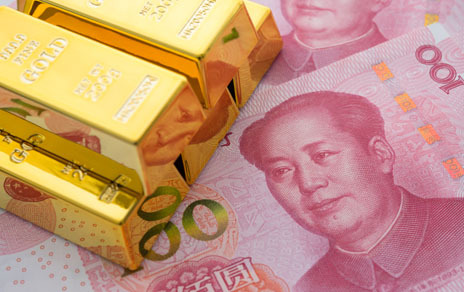
China lifts gold import limits after yuan recovers, lowering local gold premium
China’s central bank, the People’s Bank of China (PBoC), has lifted the temporary limits on gold imports that were aimed at supporting the renminbi, but which caused the local price of gold to skyrocket.
The spread between the spot price of gold in Shanghai and in London hit a record $121 per ounce last Thursday, but narrowed to $76 on Monday after the PBoC relaxed its import limits on the precious metal last week. Sources told the Financial Times that the central bank issued an informal order to some state and midsized commercial banks on Friday that the limits had been lifted.
In August, the PBoC decided to cut existing quotas and stop issuing new quotas to banks for the importation of international gold in an attempt to slow the surge in domestic gold purchases after the renminbi fell to its lowest level against the dollar in 16 years. The gap in the gold price had been steadily widening since early July, with industry insiders saying the rising premium was partially due to the curb on gold imports.
Last week, China’s central bank issued a strong statement warning currency traders against shorting the renminbi. “We will act when we act, resolutely correcting one-sided speculation,” the central bank said.
Local traders claimed the rhetoric from the PBoC was much stronger than usual and noted that state-run banks were more active than usual in exchanging U.S. dollars for renminbi on Monday.
The currency has come off its recent lows and is currently trading around Rmb 7.2938 against the greenback at the time of writing.
China’s central bank has itself been among the most active purchasers of gold this year, buying up 126 tonnes of gold through July. In August, analysts at BMO Capital Markets said they believe PBoC purchases are even higher than the reported numbers and could continue for years to come.
"Our analysis would certainly suggest that above-ground reserves of gold in China, both privately owned and those owned by the central bank, are significantly higher than annual consumer demand and official purchases might suggest," said Rory Townsend and Colin Hamilton, the authors of the report. "However, given the geopolitical backdrop and concerns over U.S. dollar dominance, we view further net additions to gold holdings as highly likely."
Currently, the People's Bank of China (PBoC) has the seventh largest gold reserves in the world at 2,113.50 tonnes, representing about 3.8% of total reserves. Analysts have speculated that the central bank is looking to increase its gold holdings to at least 5% of total reserves.
"At today's gold prices, this would require an additional 638t of PBoC purchases above current stated holdings," the analysts said.
In comparison, the U.S. has the world's largest gold reserves at 8,133.50 tonnes, representing 68.2% of total reserves.
By
Ernest Hoffman
For Kitco News
Tim Moseley
